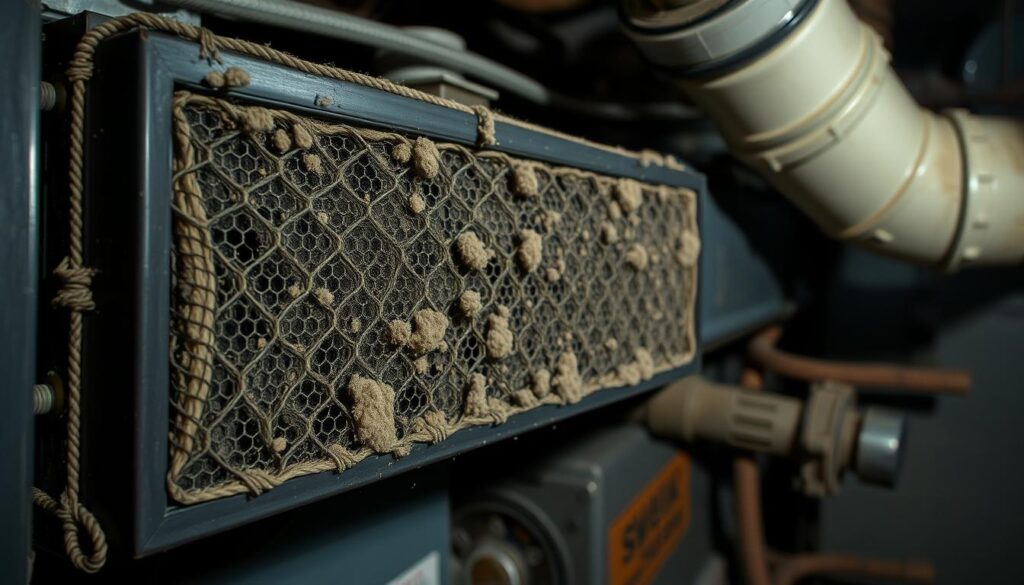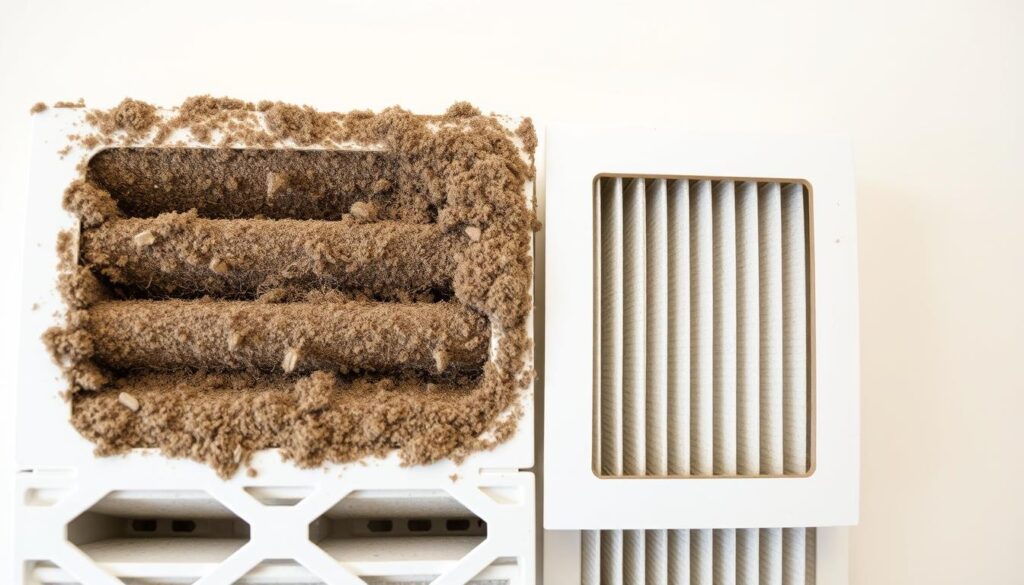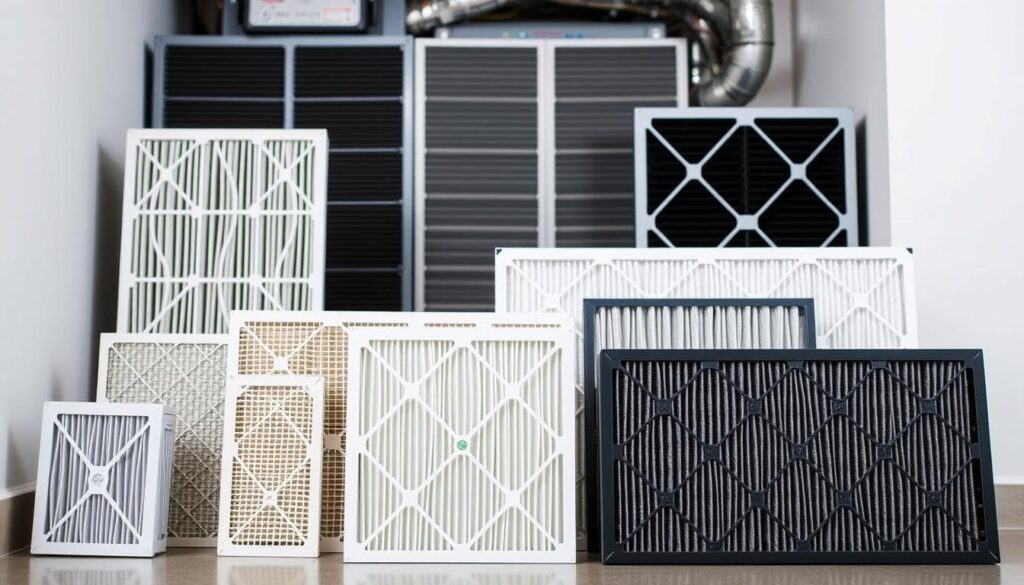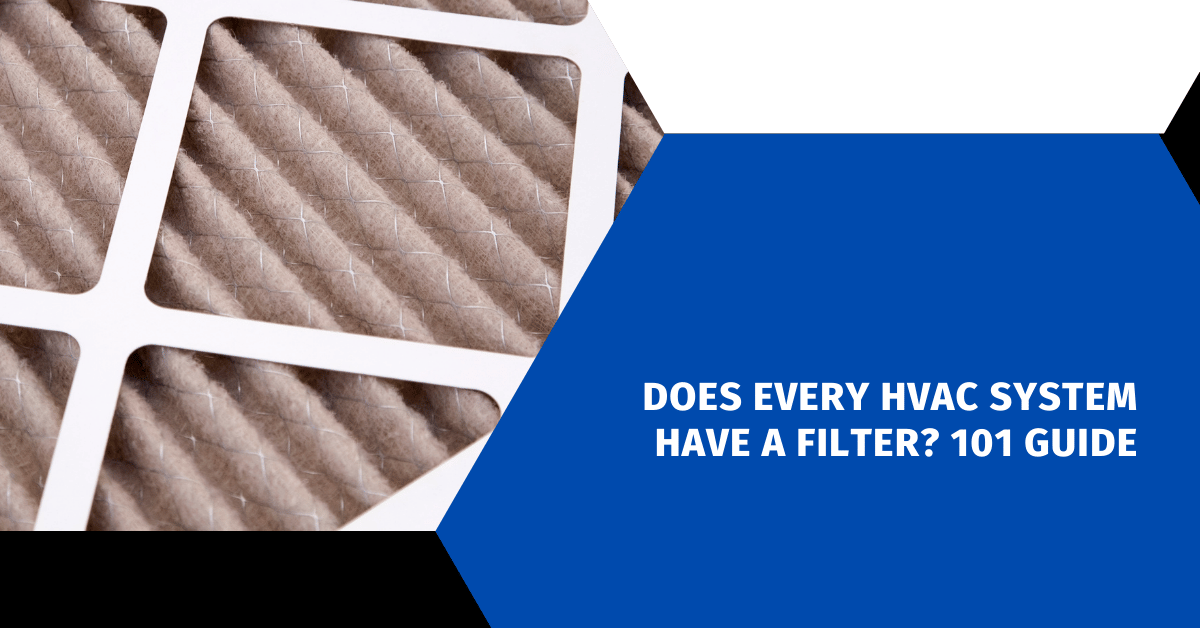Affiliate Disclosure
HVAC Guide Guys is a participant in the Amazon Services LLC Associates Program, an affiliate advertising program designed to provide a means for sites to earn advertising fees by advertising and linking to Amazon.
Does Every HVAC System Have a Filter? As a homeowner, you know how important it is to keep your home comfortable and healthy. You might wonder about the role of air filters in your HVAC system. These filters are key to keeping your air clean, protecting your family from harmful particles.
In this guide, we’ll dive into the role of HVAC filters. We’ll see how they affect your system’s efficiency and keep your air fresh. Let’s explore how to keep your home’s air clean and healthy.

Key Takeaways
- HVAC air filters are crucial components that protect your heating and cooling system from damage and improve indoor air quality.
- Filters come in various types, including standard fiberglass, pleated, media, and electrostatic, each with its own advantages.
- The MERV rating system measures a filter’s efficiency in capturing different sizes of airborne particles, with higher ratings indicating better performance.
- Replacing air filters regularly, typically every 30-90 days, is essential for maintaining optimal HVAC system performance and energy efficiency.
- Choosing the right filter size for your HVAC system is crucial to ensure proper airflow and avoid system damage.
Table of Contents
Understanding HVAC Filters and Their Essential Role
HVAC filters are key to keeping your home’s HVAC system running well. They protect the system’s parts and improve the air you breathe indoors.
Primary Functions of HVAC Filters
HVAC filters catch dust and dirt before they damage your system. This keeps the system efficient and saves you money on repairs. They also clean the air by removing allergens and pollutants, making your home healthier.
How Filters Protect Your HVAC System
Filters keep your system’s parts clean by blocking debris. A clean filter ensures good airflow, which is vital for your system’s health. If filters get clogged, your system works harder, using more energy and risking breakdowns.
Impact on Indoor Air Quality
The MERV scale measures how well filters work, from 1 to 20. Higher numbers mean better air quality. For example, HEPA filters can catch up to 99.97% of dust, pollen, and other irritants, making them great for people with allergies.
| Filter Type | MERV Rating | Filtration Efficiency |
|---|---|---|
| Fiberglass | 4 | Captures large particles |
| Pleated | 5-8 | Captures medium-sized particles |
| HEPA | 11+ | Captures small particles, including viruses and bacteria |
| UV | N/A | Kills microorganisms using ultraviolet light |
Keeping your HVAC filters clean and replacing them on time is essential. It ensures your system works well and keeps your home air clean and healthy.
Does Every HVAC System Have a Filter?
Absolutely! Every central heating and cooling system, including forced-air heating and cooling systems, needs an air filter. These filters are key to keeping your HVAC equipment running well and lasting longer.
HVAC systems draw air in through return vents and push it out through supply ducts. The air filter is usually found in one of three spots: in return air grilles, inside the air handler unit, or in a filter rack outside the air handler. The air handler, where the filter is often, is in the basement, attic, or a utility room/closet of your home.
| HVAC Filter Sizes | Typical Price Range |
|---|---|
| 12 x 12 in, 16 x 16 in, 16 x 20 in, 16 x 25 in, 20 x 20 in, 20 x 25 in | $6 – $120+ |
Filters vary in thickness from 1 inch to 5 inches. They also have a MERV rating that shows how well they catch particles. The higher the MERV rating, the better the filter is at cleaning the air.
It’s important to replace your HVAC filter regularly, usually every 1-3 months or as the manufacturer suggests. Doing so keeps your system running smoothly, saves energy, and improves indoor air quality. Not replacing the filter can cause problems like reduced airflow, higher energy bills, and damage to your HVAC equipment.
Explore Our HVAC Shop
Looking for top-rated HVAC tools, parts, and accessories? Visit our shop and find the perfect solution for your needs.
Visit the ShopCommon Types of HVAC Air Filters
HVAC systems use different air filters, each with its own benefits and filtration levels. Knowing the differences helps you pick the right one for your place.
Standard Fiberglass Filters
Fiberglass filters are simple and cheap. They catch big particles like dust and pet hair. But, they’re not good at catching small stuff because they have a low MERV (Minimum Efficiency Reporting Value) rating, usually 1 to 4.
Pleated Filters
Pleated filters are better than fiberglass ones. Their design lets them catch more particles, like pollen and pet dander. They have MERV ratings from 5 to 13, making them good for homes.
Media Filters
Media filters filter better than most. They have lots of surface area to catch many pollutants. With MERV ratings from 8 to 16, they’re great at removing dust, mold, and even tiny particles like bacteria and viruses.
Electrostatic Filters
Electrostatic filters work by attracting particles with static electricity. You can wash them, making them a green and affordable choice. Even though they have low MERV ratings, they’re still good for basic air cleaning.
| Filter Type | MERV Rating | Filtration Efficiency | Recommended Use |
|---|---|---|---|
| Fiberglass | 1-4 | 20% of particles 3-10 microns | Basic filtration for homes |
| Pleated | 5-13 | Captures pollen, pet dander | Residential HVAC systems |
| Media | 8-16 | Removes dust, mold, bacteria | High-efficiency filtration |
| Electrostatic | 1-4 | Decent basic filtration | Cost-effective air purification |
Choosing the right HVAC filter is key for clean air and protecting your system. Knowing what each filter can do helps you make the best choice for your needs.
Understanding MERV Ratings and Filter Efficiency
The MERV (Minimum Efficiency Reporting Value) scale is key for HVAC filters. It ranges from 1 to 20, showing how well a filter catches small particles. Knowing MERV ratings helps pick the best filter for your system and keeps air clean indoors.
The MERV scale makes it easy to compare filters. Home HVAC systems usually have filters rated 1-4, catching big particles like dust and pollen. Filters rated 5-8 can handle smaller particles, like mold and pet dander, and are good for many places.
For places needing very clean air, like hospitals, filters rated 13 or higher are used. These HEPA filters remove tiny contaminants, including bacteria and viruses, offering top air cleaning.
But, higher MERV ratings can mean more air resistance. This might slow down your HVAC system’s airflow and use more energy. Finding the right balance between good filtration and system performance is key.
“Choosing the right MERV-rated filter for your HVAC system is a delicate balance between filtration and airflow. Higher MERV ratings may provide superior air cleaning, but they can also restrict airflow and strain your system.”
Understanding the MERV scale helps you choose the best filter for your space. This ensures a healthy and comfortable indoor environment.
Explore Our HVAC Shop
Looking for top-rated HVAC tools, parts, and accessories? Visit our shop and find the perfect solution for your needs.
Visit the ShopWhere to Find Your HVAC System’s Filter
Keeping your HVAC system running well starts with clean air filters. But where are these filters? You can find them in the return air grilles, inside the air handler unit, or in external filter racks.
Common Filter Locations
In horizontal HVAC units, filters go into slots on the blower’s intake side. Vertical air handlers might have filters in the base or in duct tracks above or below. First, find the air handler, usually in the basement, attic, utility room, or garage.
Multiple Return Air Grilles
Some HVAC systems have many return air grilles around the house. This means you’ll find several air filters, one behind each grille. It’s important to check and replace all of them as needed.
Filter Access Points
It’s also important to know how to get to the air filter. Many systems have special panels or doors for easy filter changes. But sometimes, the filter is harder to find, needing a bit more searching.
Finding your HVAC system’s air filter is the first step to better indoor air and system performance. A little bit of searching will help you find and replace this crucial part.
“Regularly changing air filters can help HVAC systems be more efficient by preventing clogs from contaminants like dust, dirt, and animal air.”
| Filter Location | HVAC Unit Type | Accessibility |
|---|---|---|
| Intake side of blower | Horizontal units | Easy access in slots |
| Base or duct tracks | Vertical units | May require more effort |
| Behind return air grilles | Multiple return systems | Depends on grille location |
Explore Our HVAC Shop
Looking for top-rated HVAC tools, parts, and accessories? Visit our shop and find the perfect solution for your needs.
Visit the ShopSigns Your HVAC Filter Needs Replacement
Keeping up with a regular filter replacement schedule is key for your HVAC system’s efficiency and air quality. The frequency of replacement depends on the filter type, your home environment, and how much you use it. However, there are clear signs that it’s time for a new filter.
Reduced airflow is a big indicator that your filter is clogged. If your vents don’t blow air as strongly or your HVAC system takes longer to cool your home, it’s a sign. This means your filter is blocking airflow.
Increased energy bills are another sign. A dirty filter makes your HVAC system work harder, using more energy and raising your bills. Watching for sudden increases in your energy costs can help you know when to change your filter.
Lastly, poorer indoor air quality is a clear sign your filter needs to be replaced. As it gets clogged, it can’t catch airborne pollutants as well. This leads to more dust, dander, and other irritants in your home.
To keep your HVAC system running well and your air clean, replace your filters:
- Every 30-60 days for 1″ pleated filters
- Every 90 days for 2″ pleated filters
- Every 120 days for 3″ pleated filters
- Every 6 months for 4″ pleated filters
- Every 9-12 months for 5-6″ pleated filters
These times can change based on your HVAC system and how you use it. It’s best to check your filters often and replace them when needed. Keeping up with yourfilter replacement schedule and fixing anydirty filter signs will keep your HVAC system running efficiently.

Changing your HVAC filters is a simple and affordable way to protect your system and improve your air quality. Being proactive and fixing filter problems early can save you from expensive repairs. This way, you can enjoy a more comfortable and energy-efficient home all year.
How Filter Restriction Affects HVAC Performance
Choosing the right HVAC filter and keeping it clean is key. Dirty or too tight filters can hurt your system’s performance. This can lead to many problems.
Airflow Problems
A dirty air filter limits air flow in your HVAC system. This makes your furnace or air conditioner work harder. This can make your system less efficient and use more energy.
In bad cases, it can even damage your system. This can cost a lot to fix.
Energy Efficiency Impact
A dirty air filter can raise your energy use by 15%, says the U.S. Department of Energy. This means your bills will go up. Replacing your air filter often can save you money and keep your system running well.
System Strain and Damage
When your HVAC system has to work harder, it wears out faster. This can shorten the life of your furnace, air conditioner, or heat pump. Not changing your filter can lead to expensive repairs or even a new system.
Keeping your air filter clean and the right size is crucial. It helps your system work better, use less energy, and last longer.
Proper Filter Installation and Maintenance
Getting your filter installation right is key to your HVAC system’s performance. Make sure the airflow direction matches your system’s airflow for the best results. Mark the filter’s installation date and take a photo to remember when it was last changed.
Some HVAC systems need filters of different thicknesses. Check your system’s specs to find the right filter size. The wrong filter can block airflow and make your system less efficient, raising your energy bills and risking damage.
Keeping your HVAC system in top shape requires regular maintenance. Experts say to check and swap out the filter every 30 to 90 days. This depends on how much you use your system, if you have pets, and your local air quality. For high-efficiency filters, you might only need to replace them every 6 months.
| Filter Type | Recommended Replacement Interval |
|---|---|
| Standard 1″ Filters | Every 30-90 days |
| Thicker, High-Efficiency Filters | Up to 6 months |
| Reusable Filters | Clean every 3-9 months |
| Ductless Mini-Split Filters | Up to 10 years |
Regular filter maintenance boosts your indoor air quality and cuts down on allergens. It also makes your HVAC system more energy-efficient and longer-lasting. Always follow the manufacturer’s guide for installation and replacement to keep your HVAC system running smoothly.
Explore Our HVAC Shop
Looking for top-rated HVAC tools, parts, and accessories? Visit our shop and find the perfect solution for your needs.
Visit the ShopChoosing the Right Filter Size for Your System
Choosing the right air filter size is key for your HVAC system’s performance. The correct filter sizes, HVAC filter dimensions, and filter thickness are vital. They greatly affect how well your system works.
In homes, common HVAC filter dimensions are 12×12, 16×16, 16×20, 16×25, 20×20, and 20×25 inches. Filter thickness ranges from 1 to 5 inches. Most often, you’ll find 1-inch and 4-inch filters.
Standard Filter Dimensions
- 20 x 20 x 1 inches
- 16 x 25 x 1 inches
- 20 x 25 x 1 inches
- 20 x 25 x 4 inches
- 16 x 20 x 1 inches
- 16 x 25 x 4 inches
- 20 x 30 x 1 inches
- 12 x 12 x 1 inches
- 14 x 14 x 1 inches
- 14 x 20 x 1 inches
Thickness Considerations
Choosing the right filter thickness is important. It depends on your HVAC system’s capabilities. Some systems can handle different thicknesses, while others have specific needs. Always check your HVAC manual or ask a professional to ensure you pick the correct filter size and thickness.
Measuring your current filter’s dimensions is a good way to find the right replacement. Make sure to note the length, width, and thickness for a proper fit. Picking the wrong size can cause system problems, so it’s essential to get it right.

“Selecting the appropriate air filter size is crucial for the efficient and optimal performance of your HVAC system.”
Cost Considerations for HVAC Filters
HVAC filter prices change based on size, type, and quality. Basic fiberglass filters cost between $6 and $25. Pleated filters are $10 to $40. Electrostatic filters cost $15 to $50, and HEPA filters can be $50 to $120 or more.
While cheaper filters might seem like a good deal, better-quality filters save money in the long run. They improve HVAC efficiency and reduce system strain. This can lower energy bills and maintenance costs over time.
The filter’s size greatly affects its price. Larger filters, like those for whole-house systems, cost more than standard return vent filters. The MERV rating also plays a role, with higher ratings increasing the price.
Choosing the right HVAC filter means balancing initial cost and long-term benefits. Consider your HVAC system’s needs, your home’s air quality, and your budget. This will help you make a choice that offers the best value for your money.
| Filter Type | Price Range |
|---|---|
| Fiberglass | $6 – $25 |
| Pleated | $10 – $40 |
| Electrostatic | $15 – $50 |
| HEPA | $50 – $120+ |
Understanding the costs and benefits of different HVAC filters helps you make a smart choice. This choice not only protects your system but also offers long-term savings and better indoor air quality.
Explore Our HVAC Shop
Looking for top-rated HVAC tools, parts, and accessories? Visit our shop and find the perfect solution for your needs.
Visit the ShopThe Impact of Dirty Filters on Indoor Air Quality
Keeping your HVAC filters clean is key to good indoor air. Dirty filters let dust, pet dander, and pollutants spread. This can make breathing harder, especially for those with asthma or allergies.
Using high-quality filters, like those with a MERV rating of 8 or higher, helps a lot. They catch tiny particles, including bacteria and sometimes viruses. This helps keep the air in your home cleaner, especially when there’s pollution outside.
Studies show that the right HVAC filter can improve indoor air quality by up to 60%. HEPA filters, for example, can catch up to 99.97% of particles that are 0.3μm or larger. This makes the air you breathe much better.
| Filter Type | MERV Rating | Particle Capture Efficiency |
|---|---|---|
| Fiberglass | 4 | Traps larger particles |
| Pleated | 5-8 | Traps more small particles |
| HEPA | 11+ | Traps up to 99.97% of 0.3μm particles |
Changing your filters regularly is important for clean air and less respiratory problems. A dirty filter can make your HVAC system work too hard. This can lead to expensive repairs. Change your filters every three months or as needed to keep your air clean and your system running well.
“Regularly replacing or cleaning the air filter is crucial to maintaining the HVAC system and extending its lifespan.”
It’s also important to do regular HVAC maintenance. Clean parts, check connections, and check the refrigerant. These steps help keep your air quality good and your HVAC system working well.
Conclusion
Regular HVAC maintenance is key. It keeps your system running well and saves energy. Replacing air filters often is especially important.
Knowing about different filters and when to replace them helps a lot. This ensures your heating and cooling system works its best.
Installing filters right and replacing them on time is crucial. It keeps your home healthy and comfy. Spending time on filter maintenance pays off in the long run.
It leads to better energy use, fewer repairs, and cleaner air at home. This is good for you and your family.
If you have pets or live in a dusty area, you might need to change filters more often. Paying attention to signs like poor airflow or high energy bills helps. This way, you can keep your HVAC system running smoothly.

